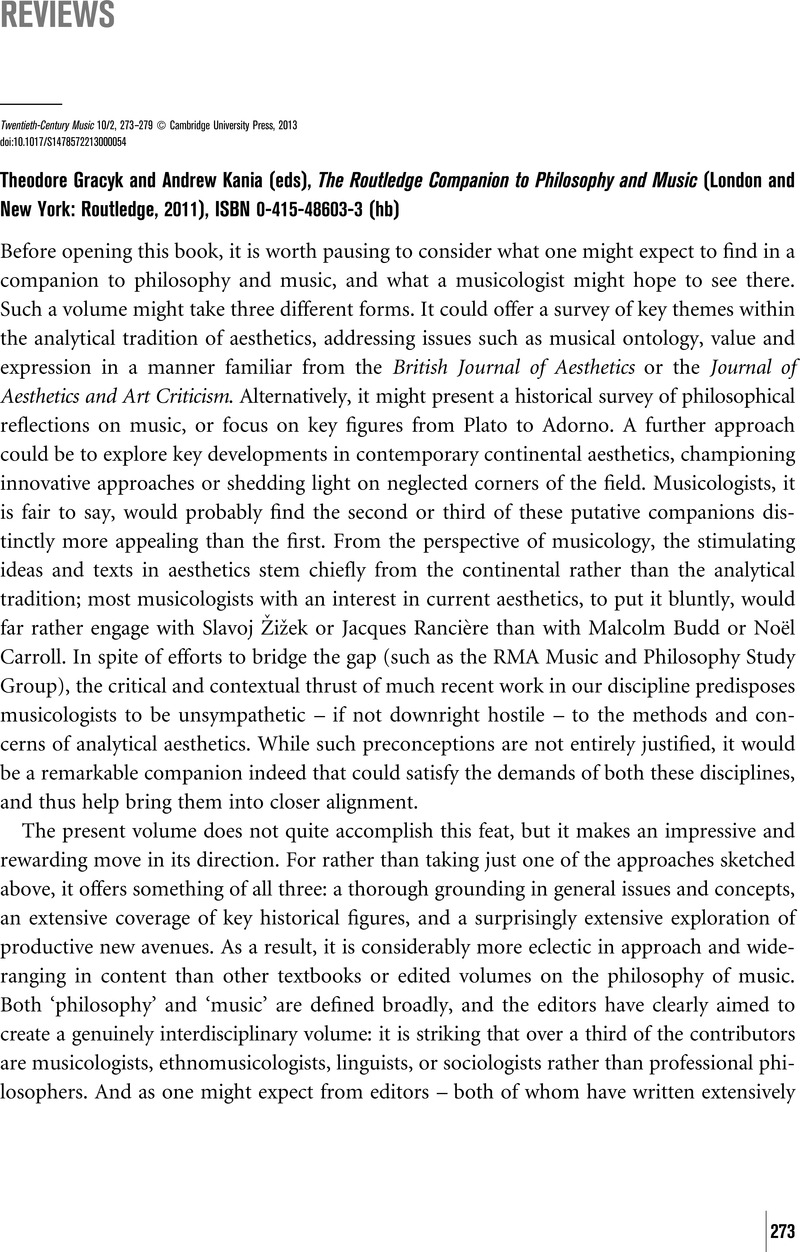No CrossRef data available.
Article contents
Theodore Gracyk and Andrew Kania (eds), The Routledge Companion to Philosophy and Music (London and New York: Routledge, 2011), ISBN 0-415-48603-3 (hb)
Published online by Cambridge University Press: 12 August 2013
Abstract

- Type
- Reviews
- Information
- Copyright
- Copyright © Cambridge University Press 2013
References
1 See Gracyk, Theodore, Rhythm and Noise: an Aesthetics of Rock (London: Tauris, 1996)Google Scholar; Gracyk, , I Wanna Be Me: Rock Music and the Politics of Identity (Philadelphia: Temple University Press, 2001)Google Scholar; Gracyk, , Listening to Popular Music: Or, How I Learned to Stop Worrying and Love Led Zeppelin (Ann Arbor: University of Michigan Press, 2007)CrossRefGoogle Scholar; and Kania, Andrew, ‘Making Tracks: the Ontology of Rock Music’, Journal of Aesthetics and Art Criticism 64 (2006), 401–14CrossRefGoogle Scholar.
2 Bowie, Andrew, Music, Philosophy, and Modernity (Cambridge: Cambridge University Press, 2007)CrossRefGoogle Scholar.
3 On the latter point, Nicholas Wolterstorff notes that ‘the analytical philosopher talks and acts as if the questions he asks […] were located in some Platonic heaven of philosophical problems’ rather than grounded in particular contexts and interests (‘Why Philosophy of Art Cannot Handle Kissing, Touching, and Crying’, Journal of Aesthetics and Art Criticism 61 (2003), 17–27 (20–1)).
4 Young, James O., Cultural Appropriation and the Arts (Malden, MA: Blackwell, 2008)CrossRefGoogle Scholar.
5 For an alternative perspective, see Nercessian, Andy, Postmodernism and Globalization in Ethnomusicology: an Epistemological Problem (Lanham, MD: Scarecrow, 2002)Google Scholar, reviewed in this journal, 2/1 (2005), 142–6.
6 Clifton, Thomas, Music as Heard: a Study in Applied Phenomenology (New Haven: Yale University Press, 1983)Google Scholar.
7 See, for example, Peterson, Richard A., ‘The Rise and Fall of Highbrow Snobbery as a Status Marker’, Poetics 25/3 (1997), 75–92CrossRefGoogle Scholar; Peterson, , ‘Problems in Comparative Research: the Example of Omnivorousness’, Poetics 33/5 (2005), 257–82CrossRefGoogle Scholar; and Eriksson, Birgit, ‘Tasting the World: Universal Openness and New Boundaries in Contemporary Cultural Taste’, in Confronting Universalities: Aesthetics and Politics under the Sign of Globalisation, ed. Baggesgaard, Mads Anders and Ladegaard, Jakob (Aarhus: Aarhus University Press, 2011), 139–61Google Scholar.
8 James Garratt, Review of Music, Criticism and the Challenge of History (2008) by Karnes, Kevin C., Music and Letters 91/3 (2010), 436–8Google Scholar.
9 Hanslick, Eduard, On the Musically Beautiful: A Contribution towards the Revision of the Aesthetics of Music, trans. and ed. Payzant, Geoffrey (Indianapolis: Hackett, 1986), 35Google Scholar.
10 Hanslick, On the Musically Beautiful, 36.
11 See Joughin, John J. and Malpas, Simon (eds), The New Aestheticism (Manchester and New York: Manchester University Press, 2003)CrossRefGoogle Scholar; Rancière, Jacques, ‘The Aesthetic Revolution and Its Outcomes’, repr. in Dissensus: On Politics and Aesthetics, ed. and trans. Corcoran, Steven (London: Continuum, 2010), 115–33Google Scholar; and Currie, James, ‘Music After All’, Journal of the American Musicological Society 62/1 (2009), 145–204CrossRefGoogle Scholar.
12 Currie, James R., Music and the Politics of Negation (Bloomington: Indiana University Press, 2012)Google Scholar.
13 On the parallel between rasa theory and Kant's aesthetics see Van den Braembussche, Antoon, ‘Sensus communis: Clarifications of a Kantian Concept on the Way to an Intercultural Dialogue Between Western and Indian Thought’, in Sensus communis in Multi- and Intercultural Perspective: on the Possibility of Common Judgments in Arts and Politics, ed. Kimmerle, Heinz and Oosterling, Henk (Würzburg: Könighausen & Neumann, 2000), 17–30Google Scholar.




